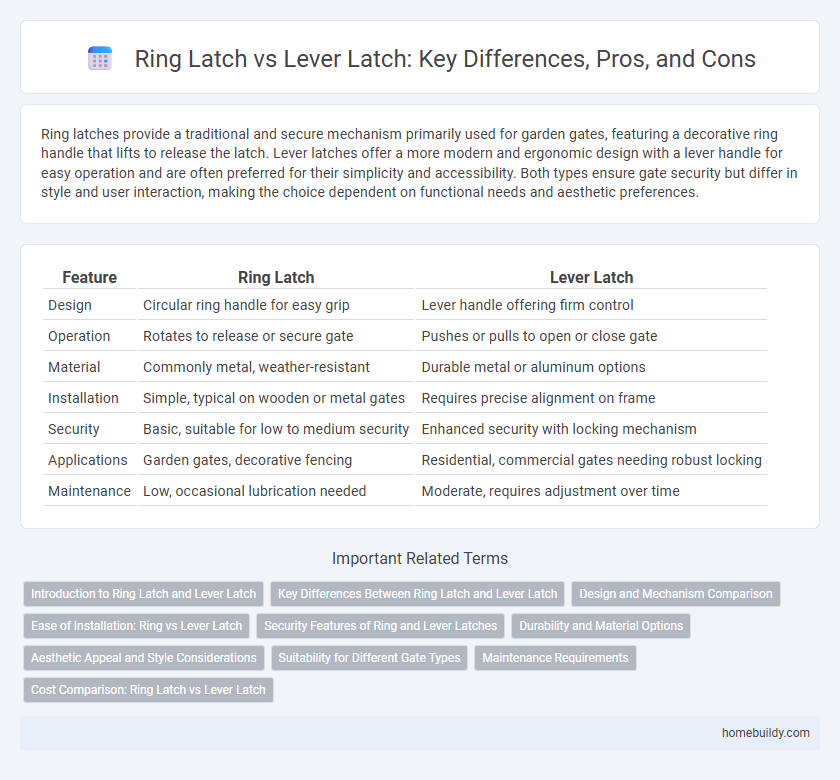Ring latches provide a traditional and secure mechanism primarily used for garden gates, featuring a decorative ring handle that lifts to release the latch. Lever latches offer a more modern and ergonomic design with a lever handle for easy operation and are often preferred for their simplicity and accessibility. Both types ensure gate security but differ in style and user interaction, making the choice dependent on functional needs and aesthetic preferences.
Table of Comparison
| Feature | Ring Latch | Lever Latch |
|---|---|---|
| Design | Circular ring handle for easy grip | Lever handle offering firm control |
| Operation | Rotates to release or secure gate | Pushes or pulls to open or close gate |
| Material | Commonly metal, weather-resistant | Durable metal or aluminum options |
| Installation | Simple, typical on wooden or metal gates | Requires precise alignment on frame |
| Security | Basic, suitable for low to medium security | Enhanced security with locking mechanism |
| Applications | Garden gates, decorative fencing | Residential, commercial gates needing robust locking |
| Maintenance | Low, occasional lubrication needed | Moderate, requires adjustment over time |
Introduction to Ring Latch and Lever Latch
Ring latches feature a circular ring handle that operates a simple catch mechanism, ideal for traditional wooden gates, offering ease of use and a classic appearance. Lever latches use a horizontal lever handle connected to a latch that retracts when lifted, providing a more modern and ergonomic solution suited for metal or garden gates. Both latches serve as secure gate fasteners but differ in design, material compatibility, and user interaction.
Key Differences Between Ring Latch and Lever Latch
Ring latch features a circular handle that operates the latch mechanism by rotating, offering a secure and straightforward locking solution commonly used in garden gates. Lever latch employs a flat, often horizontal handle that lifts or presses down to release the latch, providing ergonomic ease and quicker access in frequently used doors. Key differences include the ring latch's rotational motion versus the lever latch's vertical or horizontal lever action, with the ring latch often favored for rustic aesthetics and lever latch preferred for modern, functional gate designs.
Design and Mechanism Comparison
Ring latches feature a circular handle that rotates to retract the latch bolt, providing a smooth and compact design ideal for gates requiring ergonomic operation. Lever latches utilize a lever handle that lifts or presses to disengage the latch, offering straightforward mechanical action with enhanced leverage for easier use under tension. The ring latch mechanism excels in space-saving applications, whereas lever latches deliver robust performance with tactile feedback suited for heavier or frequently operated gates.
Ease of Installation: Ring vs Lever Latch
Ring latches offer straightforward installation with fewer components, making them ideal for quick setup on wooden gates. Lever latches require precise alignment of the lever and catch, which can be more complex but provide a more secure closure. The simplicity of ring latch installation often results in reduced labor time compared to the more intricate mechanism of lever latches.
Security Features of Ring and Lever Latches
Ring latches provide enhanced security by incorporating a locking mechanism within the ring handle, preventing unauthorized gate openings and reducing tampering risk. Lever latches often have a simpler design that may be easier to force open, but models with integrated key locks or spring-loaded bolts offer improved resistance against break-ins. Choosing between ring and lever latches depends on the required level of security, where ring latches typically deliver superior protection in residential and commercial gate applications.
Durability and Material Options
Ring latches are typically made from stainless steel or galvanized iron, offering high durability and resistance to rust, making them ideal for outdoor use in harsh weather conditions. Lever latches, often crafted from brass or zinc alloy, provide strong mechanical strength but may require additional coatings to prevent corrosion over time. Choosing between ring and lever latches depends on the specific durability needs and the availability of material finishes suited for the environment where the latch will be installed.
Aesthetic Appeal and Style Considerations
Ring latches offer a classic and elegant aesthetic with their rounded handle design, making them ideal for traditional or vintage-style gates. Lever latches provide a sleek and modern look, complementing contemporary gate designs with clean lines and minimalist features. Choosing between ring and lever latches depends on the gate's overall style, with ring latches enhancing charm and lever latches promoting a streamlined, modern appeal.
Suitability for Different Gate Types
Ring latches are ideal for wooden and metal garden gates due to their simple installation and ability to withstand weather exposure. Lever latches, with their more complex mechanisms, are better suited for heavy-duty or security gates, such as driveway or commercial gates, where durability and secure locking are crucial. Selecting the right latch depends on gate material, operational frequency, and security requirements for optimal functionality.
Maintenance Requirements
Ring latches require minimal maintenance due to their simple design and fewer moving parts, reducing the risk of malfunction over time. Lever latches demand more frequent lubrication and inspection, as their more complex mechanism involves multiple pivot points prone to wear. Choosing a ring latch minimizes upkeep efforts, especially in outdoor or high-use gate settings.
Cost Comparison: Ring Latch vs Lever Latch
Ring latches are generally more affordable than lever latches due to simpler manufacturing processes and fewer moving parts, making them a budget-friendly choice for basic gate security. Lever latches, while typically more expensive, offer enhanced durability and ease of use, justifying their higher cost for frequent operation and heavier gates. Cost comparisons should factor in not only the initial purchase price but also long-term maintenance and replacement expenses.
ring latch vs lever latch Infographic

 homebuildy.com
homebuildy.com